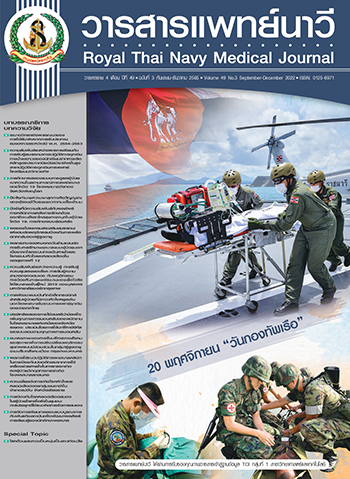Prevention of Stroke in Patients with Chronic Diseases in Community : Applying the Concept of Self-management
Main Article Content
Abstract
Stroke is a disease that results in chronic and long-term disability. The major risk factors for stroke are inappropriate health behaviors that contribute to chronic diseases, such as high blood pressure, diabetes, heart disease, and hyperlipidemia, etc. Stroke prevention in the community is an important role of community health nurses. By applying self-management concept, patients with chronic diseases increase the ability to develop desirable health behaviors through motivation, perception and decision-making process. This process enables patients to adopt good health behaviors. The self-management concept in patients with chronic diseases for stroke prevention consists of 1) goal setting, 2) data collection, 3) data processing and evaluation, 4) decision-making, 5) action, and 6) self-reflection. It is an important process that encourage patients with chronic diseases to change their thinking and decision-making process regarding their health behaviors. Through self- reflection, patients with chronic diseases gain an understanding of their own health care practices and strengthen each other's morale resulting in increasing trust in health care. A consensus is eventually formed on joint health care. Health behaviors that are consistent with the patient's daily lifestyle make it possible to control and prevent stroke without any complications from disabilities or dangers to the point of death.
Article Details

This work is licensed under a Creative Commons Attribution-NonCommercial-NoDerivatives 4.0 International License.
References
World Health Organization. Global status report on noncommunicable diseases 2014. [Internet]. [cited 2022 March 15]. Available from: http://www.who.int/nmh/ publications/ncd-status-report- 2014/en.
National institute for Emergency Medicine. Situations and trends in health and emergency medicine (World class and Thailand). [Internet]. [cited 2022 June 24]. Available from: https://www.niems.go.th/1/UploadAttachFile/2022/EBook/414764_20220208161448.pdf.
Bureau of Non Communicable Disease. Annual report 2016 NCD. Bangkok: The War Veterans Organization of Thailand Under Royal Patronageof His Majesty The King; 2016. (in Thai).
Neurological Institute of Thailand (NIT). Clinical practice guidelines for stroke rehabilitation. Bangkok: Thana Press; 2016. (in Thai)
Phongphetdit B. Participatory community-based model in promoting self-care of patients with chronic diseases to prevented stroke. Nakhon Pathom: Nakhon Pathom Rajabhat University; 2018. p. 46-8. (in Thai).
Sodaprom D. Factors influencing preventive behaviors for cerebrovascular disease among elderly risk group in the Aranyik town municipality, Mueang Phitsanulok district, Phitsanulok province. [Master’s Thesis, Faculty of Public Health]. Naresuan University; 2020. (in Thai).
Boehme AK, Esenwa C, Elkind MSV. Stroke risk factors, genetics, and prevention. Circ Res 2017;120(3):472-95.
Jaingam N, Chusri O, Pongkiatchai R, Marapen R. A concept of health management for an individual and families who have members with chronic diseases. Nursing Journal of the Ministry of Public Health 2017;27(3):1-9. (in Thai).
Creer LT. Self-management of chronic illness: handbook of self-regulation. California: Academic; 2000. p. 601-29.
Bureau of Non Communicable Disease. Situation on NCDs prevention and control in Thailand. [Internet]. [cited 2022 October 18]. Available from: http://www.thaincd.com. (in Thai).
Samphawamana O, Klaypugsee L, Arwut P, Phaenoi S. The Development of chronic disease management for patients in a health promotion hospital: a case study of Maluan Health Promotion hospital, Phunphin district, Suratthani province. Nursing Journal of the Ministry of Public Health 2017;27(1):157-67. (in Thai).
Limwattananon C, Tiamkoa S, Chonsophon S, Waleekhachonloet O, Rattanachotpanit T. Differences in stroke care and outcomes across health insurance schemes: a quantitative analysis. Research Report. Nothaburi: Health Research Institute; 2014. (in Thai)
Intolo S, Sritanyarat W. Health care service for older persons with stroke: focusing on prevention or cure. Journal of Nursing Science and Health 2016;39(4):22-32. (in Thai).
Pickham D, Valdez A, Demeestere J, Lemmens R, Diaz L, Hopper S, et al. Prognostic value of BEFAST vs. FAST to identify stroke in a prehospital setting. Prehosp Emerg Care 2019;23(2):195-200.
Skolarus LE, Zimmerman MA, Bailey S, Dome M, Murphy JB, Kobrossi C, Dombrowski SU, et al. Stroke ready intervention: community engagement to decrease prehospital delay. JAHA 2016;5(5).e003331.
Goldstein LB, Sacco RL. Stroke pathophysiology, diagnosis, and management: preventing a first stroke. 6th ed. Beijing: Elsevier Health Sciences; 2016.
Kanokvichitra A, Hemchayat U, Thummaviriya C. The development of chronic care service system in subdistrict health promoting hospital, Chanthaburi province. Journal of Health Research and Development Nakhon Ratchasima Public Health Provincial Office 2020;6(1):123-39. (in Thai).
Thangkratok P, Petchsuk R, Keinwong T, Trainattawan W, Thatdee P, Boonpradit P. Care management model for older adults with chronic diseases in the community. Royal Thai Navy Medical Journal 2020;47(1):235-48. (in Thai).
Walters JAE, Courtney-Pratt H, Cameron-Tucker H, Nelson M, Robinson A, Scott J, et al. Engaging general practice nurses in chronic disease self-management support in Australia: insights from a controlled trial in chronic obstructive pulmonary disease. Aust J Prim Health 2012;18(1):74-9.
Poomsanguan K. Health and health promotion: nurses’ important role. Journal of The Royal Thai Army Nurses 2014;15(2):10-4. (in Thai).
Chen L, Chen Y, Chen X, Shen X, Wang Q, Sun C. Longitudinal study of effectiveness of a patient-centered self-management empowerment intervention during predischarge planning on stroke survivors. Worldviews Evid Based Nurs 2018;15(3):197-205.
Kurt D, Gurdogan EP. The effect of self-management support on knowledge level, treatment compliance and self-care management in patients with hypertension. AJAN 2022;39(3):14-23.
Wattana C. Self-management support: strategies for promoting disease control. Journal of Phrapokklao Nursing College 2015;26(Suppl1 September):117-27. (in Thai).
Udonsat S, Chananin Y, Bundasak T. Nursing care for empowerment of family caregivers of elderly with stroke. Royal Thai Navy Medical Journal 2021;48(2):458-72. (in Thai).

